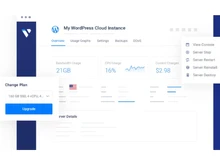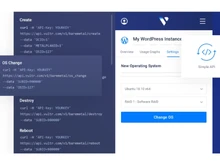Vultr and DigitalOcean are leading providers of Infrastructure as a Service (IaaS) solutions. Here, we will be comparing these two platforms. In this quick comparison between Vultr and DigitalOcean, we will examine key features like server sizes, performance grades, client base, etc. to help you differentiate between them. We will outline the distinct offerings and strengths of each provider, assisting you in making an informed decision based on your specific infrastructure needs.
Vultr vs. DigitalOcean: An Overview
Vultr is a leading provider of Infrastructure as a Service (IaaS) solutions, offering seamless cloud services for developers. It has a global network of 23 data centers across different cities and caters to a diverse range of clients, including the development community and businesses seeking reliable and scalable cloud infrastructure.
DigitalOcean, on the other hand, is also a leading provider of Infrastructure as a Service (IaaS) solutions, known for its user-friendly interface and scalable infrastructure offerings. It has a strong market presence with 14 international data centers across 185 countries. DigitalOcean caters to larger enterprises, small and medium-sized businesses, startups, and other companies. It provides versatile hosting as well as deployment solutions for web, mobile, and blockchain applications.
Vultr vs. DigitalOcean: Key Differences
Here are a few key differences between DigitalOcean and Vultr:
- Vultr provides up to 96 GB of server size while DigitalOcean and other DigitalOcean alternatives offer larger server sizes, with options reaching up to 128 GB.
- DigitalOcean operates in 14 international data centers, whereas Vultr has a more extensive network with servers running in 23 data centers.
- Vultr and a few Vultr alternatives focus on the development community and reliability in cloud infrastructure. In contrast, DigitalOcean caters to larger enterprises, small and medium-sized businesses, and startups.
Vultr and DigitalOcean: In Terms of Features
Both DigitalOcean and Vultr offer similar features such as DDOS protection, backups, back storage, object storage, SSH keys setup, non-customizable storage sizes, hourly billing, and a built-in control panel. However, they both differ in terms of other features including Latency, Server Size, VPS Instance Time, and Download/Upload Speeds. Let’s read them in detail below:
- Server Size: DigitalOcean offers server sizes ranging from 1 to 128 GB, whereas Vultr provides server sizes ranging from 1 to 96 GB.
- Latency: Both services have low and comparable latency, with DigitalOcean at 47.169 ms and Vultr at 47.006 ms.
- Download/Upload Speeds: DigitalOcean demonstrates a higher download speed at 1319.01 Mbit/s compared to Vultr's 288.73 Mbit/s. However, the upload speeds are relatively comparable, with DigitalOcean at 503.26 Mbit/s and Vultr at 502.83 Mbit/s.
- VPS Instance Time: On average, it takes DigitalOcean 42 seconds to create an instance, while Vultr takes an average of 159 seconds to create an instance.
Vultr vs. DigitalOcean: VPS Plans
DigitalOcean's VPS plans include Regular, High Performance, High Frequency, Basic Regular, Basic Premium AMD, and CPU Optimized. In contrast, Vultr's plans include Regular 1GB, High Performance 1GB, High Frequency 1GB, Regular 2GB, High Frequency 2GB, Regular 4GB, High Performance 4GB, High Frequency 4GB, Basic Regular 4GB, Basic Premium AMD 4GB, CPU Optimized 1-2-25, CPU Optimized 2-4-50, High Performance 8GB, High Frequency 16GB.
Vultr or DigitalOcean: Performance Grades
VPSBenchmarks conducted tests for web, sysbench, endurance, remote timing, and other aspects to generate performance grades for each provider. DigitalOcean and Vultr underwent performance analysis which resulted in grades focusing on network SLA. DigitalOcean provides 99.99% SLA for Volumes block storage and Droplets, while Vultr provides 100% uptime for host node and network SLA.
Vultr vs. DigitalOcean: Services Offered
Vultr offers IaaS solutions, emphasizing the provision of seamless cloud computing infrastructure for developers. In contrast, DigitalOcean provides a wide range of services including IaaS solutions for building, hosting, and deploying web and mobile applications. Additionally, it also caters to blockchain hosting, VPN server operation, as well as other SaaS needs.
Vultr and DigitalOcean: Market Presence & Popularity
DigitalOcean is widely popular among developers for its user-friendly interface and scalable infrastructure solutions. It has a strong market presence and global reach. On the other hand, Vultr despite being newer to the market, has gained a considerable user base and developer community.
Vultr and DigitalOcean: CPU/Performance Consistency
The CPUs available from both providers include a range of options such as Intel Xeon, AMD EPYC, and Intel Core. The consistency score shows that DigitalOcean has a performance consistency score of 54, while Vultr has a consistency score of 58.
Vultr vs. DigitalOcean: Client Base
DigitalOcean is known for catering to startups, SMBs, and larger enterprises including reputable companies like Ghost, Slack, and GitLab. Contrarily, Vultr has been a significant player in the development community, serving over 1.5 million customers, which include developers and businesses seeking reliable cloud infrastructure.
Verdict: Vultr vs. DigitalOcean
In conclusion, DigitalOcean and Vultr differ in server sizes, download speeds, data center reach, and target client base. DigitalOcean offers larger server sizes, higher download speeds, and a strong presence among larger enterprises and reputable companies. On the other hand, Vultr provides a more extensive network of data centers, caters to the development community, and has a client base of over 1.5 million customers. These distinctions make each provider suitable for different user preferences and business needs.


 6 Ratings & 2 Reviews
6 Ratings & 2 Reviews

























